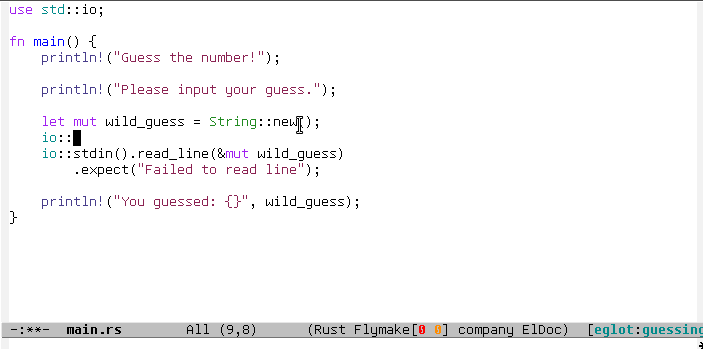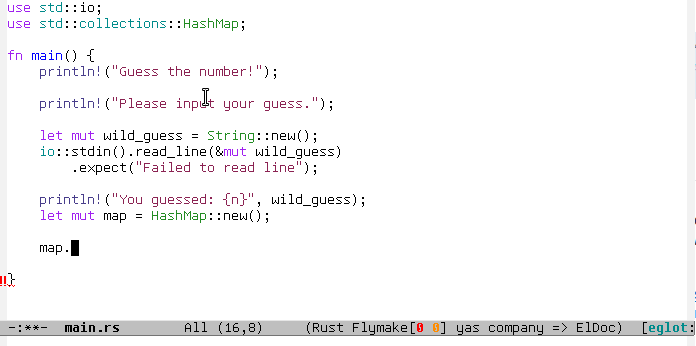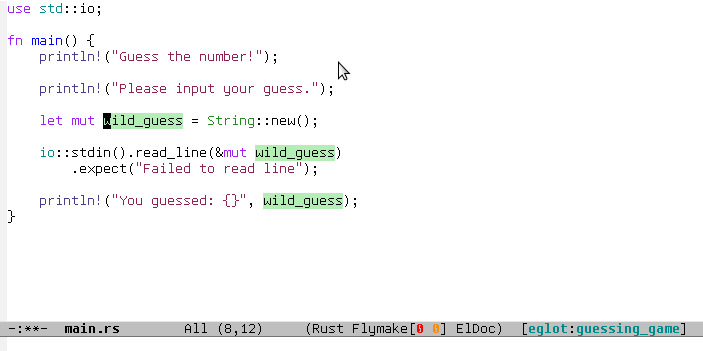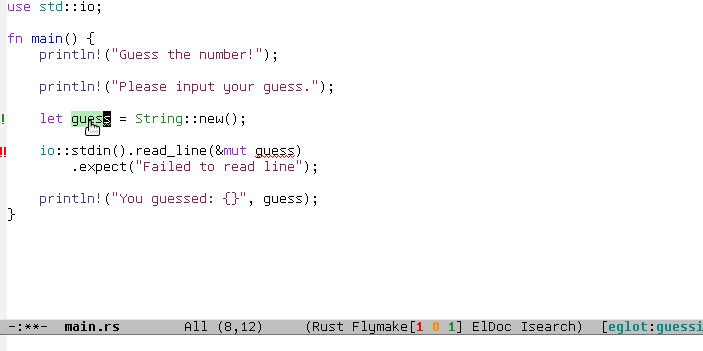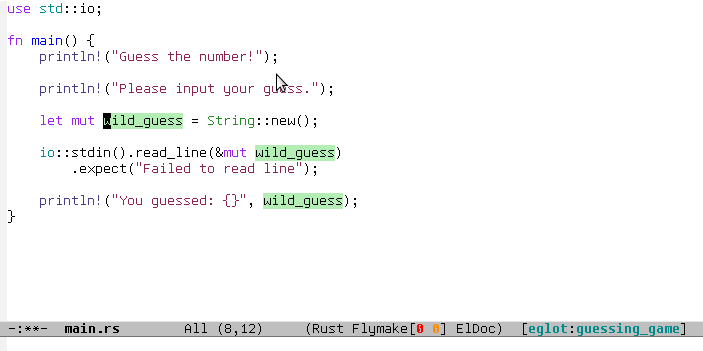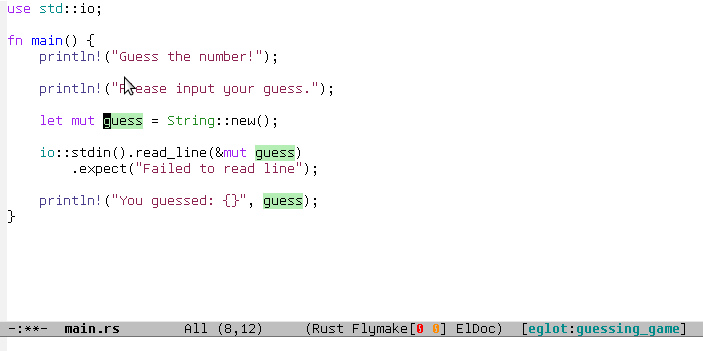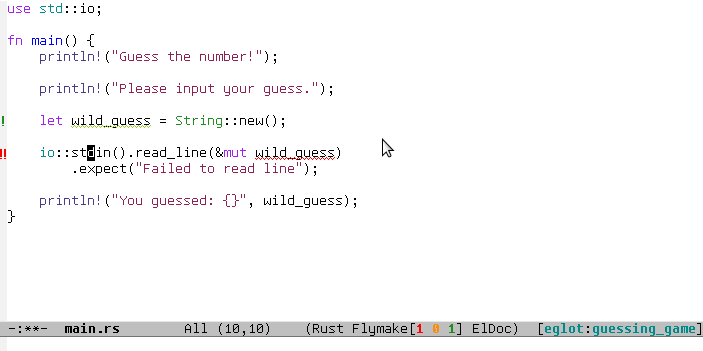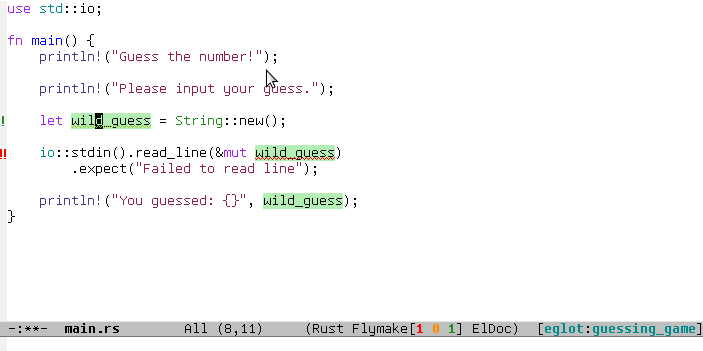Emacs Polyglot: an Emacs LSP client that stays out of your way:
- 📽 Scroll down this README for some pretty gifs
- 📚 Read about:
- 📣 Read the NEWS file
- 🏆 Folks over at Google seem to like it. Thanks!
Install from GNU ELPA or MELPA. Just type M-x package-install RET eglot RET into Emacs 26.1+.
Now find some source file, any source file, and type M-x eglot.
That's it. If you're lucky, this guesses the LSP program to start for the language you're using. Otherwise, it prompts you to enter one.
By design, Eglot doesn't depend on anything but Emacs. But there
are ELPA dependencies to newer versions of so-called "core packages"
developed in the Emacs mainline. So unless you're using a
bleeding-edge Emacs, where loading eglot.el is all you'd need to do,
make sure your package system pulls in and loads the newest
project.el, xref.el, eldoc.el, etc... In case of trouble M-x find-library can help you tell if that happened.
M-x eglot can guess and work out-of-the-box with these servers:
- Ada's ada_language_server
- Bash's bash-language-server
- C/C++'s clangd or ccls
- C#'s omnisharp
- Clojure's clojure-lsp
- CMake's cmake-language-server
- CSS's css-languageserver
- Dart's analysis_server
- Dockerfile's docker-langserver
- Elixir's elixir-ls
- Elm's elm-language-server
- Erlang's erlang_ls
- Fortran's fortls
- Futhark's futhark lsp
- Go's gopls
- Godot Engine's built-in LSP
- HTML html-languageserver
- Haskell's haskell-language-server
- JSON's vscode-json-languageserver
- Java's Eclipse JDT Language Server
- Javascript's TS & JS Language Server
- Kotlin's kotlin-language-server
- Lua's lua-lsp
- Markdown's marksman
- Mint's mint-ls
- Nix's rnix-lsp
- Ocaml's ocaml-lsp
- Perl's Perl::LanguageServer
- PHP's php-language-server
- PureScript's purescript-language-server
- Python's pylsp, pyls pyright, or jedi-language-server
- R's languageserver
- Racket's racket-langserver
- Ruby's solargraph
- Rust's rust-analyzer
- Scala's metals
- TeX/LaTeX's Digestif
- VimScript's vim-language-server
- YAML's yaml-language-server
- Zig's zls
I'll add to this list as I test more servers. In the meantime you can
customize eglot-server-programs:
(add-to-list 'eglot-server-programs '(foo-mode . ("foo-language-server" "--args")))Let me know how well it works and we can add it to the list.
To skip the guess and always be prompted use C-u M-x eglot.
You can also do:
(add-hook 'foo-mode-hook 'eglot-ensure), to attempt to start an eglot session automatically every time a
foo-mode buffer is visited.
The examples above use a "pipe" to talk to the server, which works fine on Linux and OSX but in some cases may not work on Windows.
To circumvent this limitation, or if the server doesn't like pipes,
you can use C-u M-x eglot and give it server:port pattern to
connect to a previously started TCP server serving LSP information.
If you don't want to start it manually every time, you can configure Eglot to start it and immediately connect to it. Ruby's solargraph server already works this way out-of-the-box.
For another example, suppose you also wanted start Python's pyls
this way:
(add-to-list 'eglot-server-programs
`(python-mode . ("pyls" "-v" "--tcp" "--host"
"localhost" "--port" :autoport)))You can see that the element associated with python-mode is now a
more complicated invocation of the pyls program, which requests that
it be started as a server. Notice the :autoport symbol in there: it
is replaced dynamically by a local port believed to be vacant, so that
the ensuing TCP connection finds a listening server.
Many servers can guess good defaults and operate nicely out-of-the-box, but some need to know project-specific settings, which LSP calls "workspace configuration".
Within Eglot, these per-project settings are realized with the Elisp
variable eglot-workspace-configuration. They are sent over to the
server:
- initially, as a
didChangeConfigurationnotification; - as the response to configuration request from the server.
Before considering what to set the variable to, one must understand how to set it and whether to set it at all.
Most servers can be configured globally using some kind of global file
in the user's home directory or in the project directory --
Pylsp reads ~/.config/pycodestyle and Clangd
reads .clangd anywhere up the current project tree.
This type of configuration is done completely independently from Eglot and Emacs and has the advantage that it'll work with other LSP clients.
On the other hand, one may find this not flexible enough or wish to consolidate all configuration within Emacs.
In that case, the directory variable
eglot-workspace-configuration should be used.
Note that while it is possible to set this variable globally or
buffer-locally, doing so makes little sense. It is usually set via
.dir-locals.el or special-purpose elisp
functions.
The recommended format for this variable's value is a property list:
(SECTION-1 PARAM-OBJECT-1 ... SECTION-N PARAM-OBJECT-N)
(Yes, earlier it used to be an association list, a format that is still supported, but discouraged.)
Each SECTION-N is an Elisp keyword naming a parameter section
relevant to an LSP server.
PARAM-OBJECT-N contains one or more settings pertaining to the
server that is interested in SECTION-N. Its value is an Elisp
object serialized to JSON by json-serialize. The
recommended format is again a plist, though json-serialize
also accepts other formats.
In any case, the JSON values true, false and {} are represented
by the Elisp values t, :json-false and nil, respectively.
When experimenting with settings, one may use M-x eglot-show-workspace-configuration to inspect/debug the definite JSON
value sent over to the server. This helper function works even before
actually connecting to the server.
To make a particular Python project always enable Pylsp's
snippet support, put a file named .dir-locals.el in the project's
root:
((python-mode
. ((eglot-workspace-configuration
.
;; the value in the format described above starts here
(:pylsp (:plugins (:jedi_completion (:include_params t
:fuzzy t)
:pylint (:enabled :json-false))))
;; and ends here
))))This tells Emacs that any python-mode buffers in that directory
should have a particular value of eglot-workspace-configuration.
Here, the value in question associates the parameter section :pylsp
with a parameter object that is a plist of plists. It is converted to
JSON before being sent to the server:
{
"pylsp": {
"plugins": {
"jedi_completion": { "include_params": true, "fuzzy": true },
"pylint": { "enabled": false }
}
}
}Suppose one also has some Go code in the very same project, the
Gopls server can be configured in the same .dir-locals.el
file. Adding a section for go-mode, the file's contents now become:
((python-mode
. ((eglot-workspace-configuration
. (:pylsp (:plugins (:jedi_completion (:include_params t
:fuzzy t)
:pylint (:enabled :json-false)))))))
(go-mode
. ((eglot-workspace-configuration
. (:gopls (:usePlaceholders t))))))Alternatively, as a matter of taste, one may choose to lay out
.dir-locals.el like so:
((nil
. ((eglot-workspace-configuration
. (:pylsp (:plugins (:jedi_completion (:include_params t
:fuzzy t)
:pylint (:enabled :json-false)))
:gopls (:usePlaceholders t))))))This is an equivalent setup which sets the value in all major-modes inside the project: the major-mode specification is unneeded because the LSP server will retrieve only the parameter section it is interested in.
If adding a .dir-locals.el file isn't suitable, or if managing this
file becomes cumbersome, the Emacs manual
teaches you programmatic ways to leverage per-directory local
variables. Look for the functions dir-locals-set-directory-class
and dir-locals-set-class-variables.
If one needs to determine the workspace configuration based on some
dynamic context, eglot-workspace-configuration can be set to a
function. It is passed the eglot-lsp-server instance of the
connected server (if any) and runs with default-directory set to the
root of your project. The function should return a value of the same
form as described in the previous paragraphs.
Some servers need even more special hand-holding to operate correctly. If your server has some quirk or non-conformity, it's possible to extend Eglot via Elisp to adapt to it. Here's an example on how to get cquery working:
(add-to-list 'eglot-server-programs '((c++ mode c-mode) . (eglot-cquery "cquery")))
(defclass eglot-cquery (eglot-lsp-server) ()
:documentation "A custom class for cquery's C/C++ langserver.")
(cl-defmethod eglot-initialization-options ((server eglot-cquery))
"Passes through required cquery initialization options"
(let* ((root (car (project-roots (eglot--project server))))
(cache (expand-file-name ".cquery_cached_index/" root)))
(list :cacheDirectory (file-name-as-directory cache)
:progressReportFrequencyMs -1)))Similarly, some servers require the language identifier strings they
are sent by eglot to match the exact strings used by VSCode. eglot
usually guesses these identifiers from the major mode name
(e.g. elm-mode → "elm"), but the mapping can be overridden using
the :LANGUAGE-ID element in the syntax of eglot-server-programs if
necessary.
Should just work. Try M-x eglot in a buffer visiting a remote file
on a server where you've also installed the language server. Only
supported on Emacs 27.1 or later.
Emacs 27 users may find some language servers fail to start up over TRAMP. If you experience this issue, update TRAMP to 2.5.0.4 or later.
Having trouble connecting to a server? Expected to have a certain capability supported by it (e.g. completion) but nothing happens? Or do you get spurious and annoying errors in an otherwise smooth operation? We may have help, so open a new issue and try to be as precise and objective about the problem as you can:
-
Include the invaluable events transcript. You can display that buffer with
M-x eglot-events-buffer. It contains the JSONRPC messages exchanged between client and server, as well as the messages the server prints to stderr. -
If Emacs errored (you saw -- and possibly heard -- an error message), make sure you repeat the process using
M-x toggle-debug-on-errorso you get a backtrace of the error that you should also attach to the bug report. -
Try to replicate the problem with as clean an Emacs run as possible. This means an empty
.emacsinit file or close to it (just loadingeglot.el,company.elandyasnippet.elfor example, and you don't even needuse-package.elto do that).
Some more notes: it is often the case the you will have to report the problem to the LSP server's developers, too, though it's understandable that you report it Eglot first, since it is the user-facing frontend first. If the problem is indeed on Eglot's side, we do want to fix it, but because Eglot's developers have limited resources and no way to test all the possible server combinations, you'll sometimes have to do most of the testing.
Here's a summary of available commands:
-
M-x eglot, as described above; -
M-x eglot-reconnectreconnects to current server; -
M-x eglot-shutdownsays bye-bye to server of your choice; -
M-x eglot-shutdown-allsays bye-bye to every server; -
M-x eglot-renameask the server to rename the symbol at point; -
M-x eglot-formatasks the server to format buffer or the active region; -
M-x eglot-code-actionsasks the server for any "code actions" at point. Can also be invoked bymouse-1-clicking some diagnostics. AlsoM-x eglot-code-action-<TAB>for shortcuts to specific actions. -
M-x eldocasks the Eldoc system for help at point (this command isn't specific to Eglot, by the way, it works in other contexts). -
M-x eglot-events-bufferjumps to the events buffer for debugging communication with the server. -
M-x eglot-stderr-bufferif the LSP server is printing useful debug information in stderr, jumps to a buffer with these contents. -
M-x eglot-signal-didChangeConfigurationupdates the LSP server configuration according to the value of the variableeglot-workspace-configuration, which you may be set in a.dir-localsfile, for example.
There are no keybindings specific to Eglot, but you can bind stuff
in eglot-mode-map, which is active as long as Eglot is managing a
file in your project. The commands don't need to be Eglot-specific,
either:
(define-key eglot-mode-map (kbd "C-c r") 'eglot-rename)
(define-key eglot-mode-map (kbd "C-c o") 'eglot-code-action-organize-imports)
(define-key eglot-mode-map (kbd "C-c h") 'eldoc)
(define-key eglot-mode-map (kbd "<f6>") 'xref-find-definitions)Here's a quick summary of the customization options. In Eglot's
customization group (M-x customize-group) there is more
documentation on what these do.
-
eglot-autoreconnect: Control ability to reconnect automatically to the LSP server; -
eglot-connect-timeout: Number of seconds before timing out LSP connection attempts; -
eglot-sync-connect: Control blocking of LSP connection attempts; -
eglot-events-buffer-size: Control the size of the Eglot events buffer; -
eglot-ignored-server-capabilities: LSP server capabilities that Eglot could use, but won't; -
eglot-confirm-server-initiated-edits: If non-nil, ask for confirmation before allowing server to edit the source buffer's text;
There are a couple more variables that you can customize via Emacs lisp:
-
eglot-server-programs: as described above; -
eglot-strict-mode: Set tonilby default, meaning Eglot is generally lenient about non-conforming servers. Set this to(disallow-non-standard-keys enforce-required-keys)when debugging servers. -
eglot-server-initialized-hook: Hook run after server is successfully initialized; -
eglot-managed-mode-hook: Hook run after Eglot started or stopped managing a buffer. Useeglot-managed-pto tell if current buffer is still being managed. -
eglot-stay-out-of: List of Emacs features that Eglot shouldn't automatically try to manage on users' behalf. Useful when you need non-LSP Flymake or Company backends. See docstring for examples. -
eglot-extend-to-xref: If non-nil andxref-find-definitionslands you in a file outside your project -- like a system-installed library or header file -- transiently consider it managed by the same LSP server. That file is still outside your project (i.e.project-find-filewon't find it).
M-x eglot starts a server via a shell-command guessed from
eglot-server-programs, using the current major-mode (for whatever
language you're programming in) as a hint.
If the connection is successful, you see an [eglot:<server>]
indicator pop up in your mode-line. More importantly, this means
current and future file buffers of that major mode inside your
current project automatically become "managed" by the LSP server,
This means that information about these file's contents is exchanged
periodically to provide enhanced coding assistance. Eglot works
primarily with Emacs' built-in libraries and not with third-party
replacements for those facilities.
- definitions can be found via
xref-find-definitions; - on-the-fly diagnostics for the buffer or project are given by
flymake-mode; - function signature hints are given by
eldoc-mode; - completion can be summoned with
completion-at-point. - projects are discovered via
project.el's API;
Some extra features are provided if certain libraries are installed and enabled, such as:
- completion dropdowns via company;
- snippet completions via yasnippet;
- marked-up documentation via markdown.
Eglot doesn't require these libraries to work effectively, but will use them automatically if they are found to be active.
To "unmanage" a project's buffers, shutdown the server with M-x eglot-shutdown.
The animation shows company-mode presenting the completion
candidates to the user, but Eglot works with the built-in
completion-at-point function as well, which is usually bound to
C-M-i.
Eglot provides template based completion if the server supports
snippet completion and yasnippet is enabled before
Eglot connects to the server. The animation shows
company-mode, but completion-at-point also works with
snippets.
Eglot relays the diagnostics information received from the LSP server
to Emacs's Flymake, which annotates/underlines the
problematic parts of the buffer. The information is shared with the
ElDoc system, meaning that the commands eldoc and
eldoc-doc-buffer (the latter bound to C-h-. for convenience) show
diagnostics along with other documentation under point.
Flymake provides other convenient ways to view and manage diagnostic errors. These are described in its manual.
When Eglot manages a buffer, it disables pre-existing Flymake
backends. See variable eglot-stay-out-of to change that.
The LSP server may provide code actions, for example, to fix a
diagnostic error or to suggest refactoring edits. The commands are
frequently associating with Flymake diagnostic annotations, so that
left-clicking them shows a menu. Additionally, the command
eglot-code-actions asks the server for any code spanning a given
region.
Sometimes, these code actions are initiated by the server. See
eglot-confirm-server-initiated-edits to control that behaviour.
Here, too, the LSP server's view of a given symbol or function
signature is relayed to the ElDoc system. The commands
eldoc and eldoc-doc-buffer commands access that information.
There are customization variables to help adjust ElDoc's
liberal use of the lower "echo area", among other options. If you
still find the solicitous nature of this LSP feature too distracting,
you can use eglot-ignored-server-capabilities to turn it off.
Type M-x eglot-rename RET to rename the symbol at point.
To jump to the definition of a symbol, use the built-in
xref-find-definitions command, which is bound to M-..
Eglot here relies on Emacs' built-in functionality as well.
xref-find-references is bound to M-?. Additionally, Eglot
provides the following similar commands: eglot-find-declaration,
eglot-find-implementation, eglot-find-typeDefinition.
Around May 2018, I wrote a comparison of Eglot to lsp-mode.el, and
was discussed with its then-maintainer. That mode has since been
refactored/rewritten and now
purports to support
a lot of features that differentiated Eglot from it. It may now be
very different or very similar to Eglot, or even sing with the birds
in the trees, so go check it out. That said, here's the
original comparison, which I will not be updating any more.
"Eglot is considerably less code and hassle than lsp-mode.el. In most cases, there's nothing to configure. It's a minimalist approach focused on user experience and performance.
User-visible differences:
-
The single most visible difference is the friendly entry point
M-x eglot, notM-x eglot-<language>. Also, there are noeglot-<language>extra packages. -
There's no "whitelisting" or "blacklisting" directories to languages.
M-x eglotstarts servers to handle file of a major mode inside a specific project, using Emacs's built-inproject.ellibrary to discover projects. Then it automatically detects current and future opened files under that project and syncs with server; -
Easy way to quit/restart a server, just middle/right click on the connection name;
-
Pretty interactive mode-line section for live tracking of server communication;
-
Automatically restarts frequently crashing servers;
-
Slow-to-start servers start asynchronously in the background;
-
Server-initiated edits are confirmed with the user;
-
Diagnostics work out-of-the-box (no
flycheck.elneeded); -
Smoother/more responsive (read below).
Under the hood:
- Message parser is much simpler.
- Defers signature requests like
textDocument/hoveruntil server is ready. - Sends
textDocument/didChangefor groups of edits, not one per each tiny change. - Easier to read and maintain elisp. Yeah I know, very subjective, so judge for yourself.
- Doesn't require anything other than Emacs, but will automatically
upgrade to work with stuff outside Emacs, like
company,markdown-mode, if you happen to have these installed. - Has automated tests that check against actual LSP servers."
Eglot is subject to the same copyright assignment
policy as GNU Emacs.
Any legally significant contributions can only be merged after the author has completed their paperwork. Please ask for the request form, and we'll send it to you.
